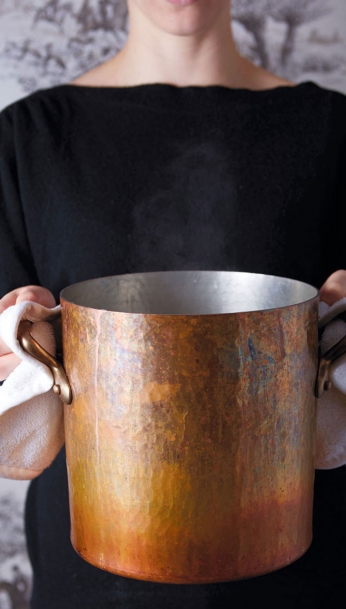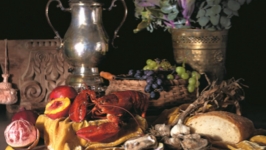What Calls to Us: How Scent is Always a Homecoming
Two sailors, fresh from icy seas, stumble and weave their way through the dark streets of a seaside town in Massachusetts, searching for salvation in the form of chowder. Their only guide a series of vague directions to an unmarked door hidden in a snow-banked landscape of alleys and dead ends.
If you made it past “Call me Ishmael” in Moby Dick, the scene might sound familiar. Herman Melville devotes an ecstatic chapter — ”Chowder”— to the clam and cod varieties Ishmael and Queequeg devour after their first trip out. Once found, the mystery door opens to “a warm savory steam from the kitchen” and, according to Ishmael, “when that smoking chowder came in…Oh, sweet friends! Hearken to me… Our appetites being sharpened by the frosty voyage, we despatched it with great expedition.”
Melville gets his science right. Ishmael and Queequeg are more hungry for the cold. Cold burns calories and the body cries out for extra nourishment. Cold also dulls the nose and dry, winter air slows the spread of scent molecules. In winter we smell less, and because we smell less what we do smell comes at us sharply, clear of interference. And if the source is both hot and humid, like soup? That savory aroma would have volleyed through the air to torch the icy cover of Ishmael’s nose with buttery heat.
What I took from my first reading of Moby Dick, what stayed with me all these years is the smell of that chowder. But Melville doesn’t describe the scent, not really. All he gives us is “savory aroma” and, later, “fishy.”
Scent is the lifeblood of food. Without it, there is no taste. An experienced cook relies as much on her nose as she does her eyes and ears. A smell tells us immediately if things are going well and one half second too late if they aren’t (the damn toast). Cooking, putting meat or vegetable to heat, triggers chemical reactions, all of which leave an aromatic trace. Our ancestors depended upon smell to keep them alive—avoiding, no doubt, fishy. We depend on it still, and, threat of death largely removed, we savor it. But do we ever really describe it?
I pull out my books. I remember food scents. But Moby Dick has me worried I’m no better than the eye witnesses on Oprah, the ones who watch a mock-attack right there on the studio stage and then, just two minutes later, get everything wrong about the attacker. What if I’m a shoddy nose witness? To me, both personally and professionally, this is a serious question.
I flip through Heidi, where I swore I would find an evocative description of the raclette cheese her grandfather warmed over the fire. And find it I do. The description, so grand in my memory, is “toasted.”
Smelling is an immediate and individual neurological process. How we interpret scents is as personal as a fingerprint. Even though we think we hold scent memories deep in our hearts or in our bones, that we have some say in how we remember smells, our brain makes scent associations and commits them to memory in spite of us. You usually don’t know what your scents are until you re-encounter them.
Smells draw their power not from potency, but from the memories they evoke. A delicate scent can be as fierce as a steel trap, catching you in a moment you thought you had long since left behind. Stronger scents, equally so. My husband, a former choir boy, hasn’t seen an altar in 30 years. He once sniffed the air as I stirred a winedark stew. “Oh,” he said, surprised and pleased. “Smells like church.”
Once an association is made, scent and memory travel in lockstep through time. Personalized scent makers understand that yoking effect. They embrace what traditional perfumers have wiggled around for years. We don’t return to scents because they make us feel strong, sexy or whatever the ad is selling. We seek the scents that take us home: To our mother’s tomato plants, to blackberrying with our sisters or to the churches of our youth. For me, it has always been the smell of cut hay, a great disappointment to someone who longed for something glamorous, yet true to the girl who grew up pressing her face against a horse’s neck. The real truth is that the smell chooses us.
But that doesn’t mean we have no role to play. There’s a reason I remember the chowder and the toasted bread being more, well, smelly, than they are. Heidi, in particular, creates a shared scent memory through repetition and naming. Think bacon every Sunday or hot cocoa on snow days. Heidi’s grandfather toasts cheese every time Heidi —literally— comes home. That’s smell at its finest. It collects meaning over time. It says little, but it tells us everything.
Like a hound after a hare, we pursue the scents that call to us. But what we are really chasing are memories. Memories to make and to share. Our nose can help us do so more consciously. As with an eye for art or an ear for music, the nose is a muscle we can grow and that process begins with naming, out loud, what we smell.
Winter is the time. Let’s take advantage of the clarity the cold provides and make a practice of active smelling. Forget “smells good” and say what you smell: cinnamon and clove in a hot toddy, leeks sweating in butter, pine filling your living room with its fresh fragrance. Where once you stumbled unexpectedly on an unmarked door, you might eventually know your way.





